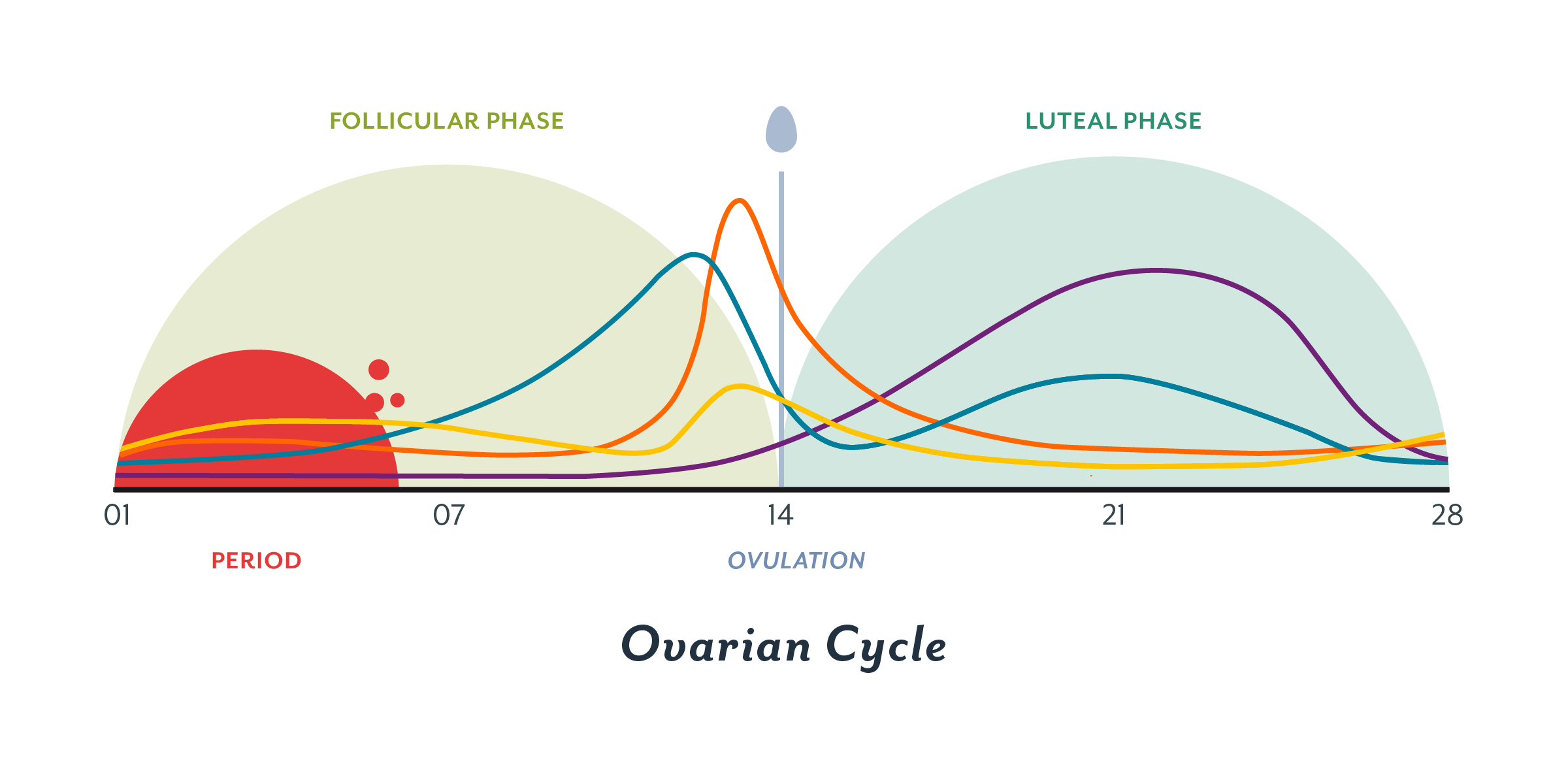Here's Why You Have Painful Periods
Nov 01, 2022
Painful periods are no fun. But they give you information into what's going on in your body. Pain anywhere is your body's way of signaling that something is off and needs attention!
So don't ignore it and push through it. And if you've been told period pain is "normal," well, keep reading.
Let's start by looking at what your period should look like:

Starting with the follicular phase, this is when estrogen (blue line) is at its highest in your cycle. Luteal phase is when progesterone (purple line) is (and should be) the "dominant" hormone.
Estrogen rises here as well, but in comparison to progesterone, it should remain lower.
You want progesterone to be higher than estrogen in your luteal phase.
Your hormones should be in this interplay with each other- ebbing and flowing. It's when we see this pattern get off or happening irregularly that you start to notice period problems.
Why Does Period Pain Happen?
-
Primary dysmenorrhea (inflammatory markers like prostaglandins)
-
Secondary dysmenorrhea (caused by disorder in reproductive organs. i.e. endometriosis, fibroids, cysts, etc. Generally lasts longer than your period and progressively gets worse over time)
-
Nausea/vomiting
-
Having to lay in bed all day curled up in fetal position
-
Dizziness
-
Needing around the clock pain medications
1. Prostaglandins
Prostaglandins are a major factor for this. Prostaglandins are hormone-like chemicals that can affect your uterine tone and also causes high-amplitude contractions of the uterine muscle and blood vessels. They're necessary to help expel the lining of your uterus- AKA your period. But too much of them can cause excess pain.
The levels of prostaglandins are generally highest in the beginning on the first 1-2 days (this is why you might notice the most pain around this time). As more of your lining is shed, you'll notice less pain.
2. Vasopressin
Vasopressin is another hormone that has been linked to period pain. This hormone is responsible for uterine contractility (basically this hormone, like prostaglandins, help the uterus to contract and expel the lining).
3. Estrogen "dominance"
As mentioned earlier, estrogen levels are generally higher in the follicular phase of your cycle, but in luteal phase, they should drop a bit and let progesterone be the dominant hormone. If you have symptoms of pain, this could be due to the fact that your luteal phase estrogen levels are higher than your progesterone levels. Working on liver metabolism of estrogen and excretion of estrogen will be important factors to lower your overall estrogen levels if this is the case.
4. Stress, diet, sleep, lifestyle factors
These are all factors that can cause excess inflammatory cytokines and raise prostaglandin levels within your body.
Poor sleep, diets high in processed food (fast food, packaged food, fried foods, etc) or alcohol, lack of sleep, and high levels of stress are all risk factors for increasing your overall level of inflammatory markers in your body that in response will create more pain.
What Can You Do About It?
-
Have a healthy bedtime/sleep routine (consistently wake up and go to bed around the same time every day)
-
Practice skills for stress management. Stress is a huge factor for inflammatory markers being elevated. Things like paced breathing, meditation, exercise, social connections, therapy, etc can make a huge difference for this!
-
Eating more whole foods. Avoiding ultra-processed foods, fast foods, and low nutrient content foods, while increasing your veggie, fruit, and whole grain intake can be really helpful for increasing fiber, increasing healthy gut bacteria, and lowering inflammatory levels.
-
Green tea. This is a great way to get your antioxidants in, while also helping your hormones, stress, and getting a small boost!
-
If estrogen dominance is part of your picture, addressing liver metabolism of your estrogens will be important.
-
Gut and kidney excretion will also be really important. If your liver has metabolized the estrogen, but it's not exiting your body, you're just keeping all that estrogen circulating in your body.
SUBSCRIBE FOR WEEKLY HORMONAL HEALTH INFO
Learn about lab testing, supplements, nutrition, and more!
We hate SPAM. We will never sell your information, for any reason.


